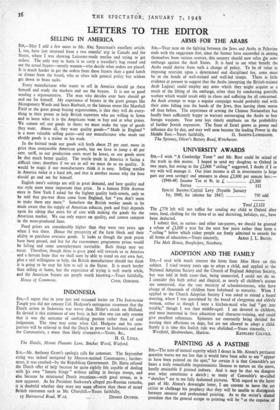LETTERS TO THE EDITOR
SELLING IN AMERICA
SIR,—May I add a few notes to Mr. Alec Spearman's excellent article. I, too, have just returned from a two months' trip in Canada and the States, where I was showing Leicester-made textiles and trying to get orders. The only way to learn is to carry a traveller's bag round and see the actual buyers—mostly women—who decide what orders are placed. It is much harder to get the orders from these buyers than a good lunch or dinner from the board, who so often talk general policy but seldom get down to brass tacks.
Every manufacturer who wants to sell in America should go there himself and study the markets and see the buyers. It is not so good sending a representative. The man who decides over here should go and see for himself. My experience of buyers in the giant groups like Montgomery Wards and Sears Roebuck, or the famous stores like Marshall Field or the great group buying organisations, is that they will do every- thing in their power to help British exporters who are willing to listen and to learn what it is the Americans want to buy and at what prices. We cannot sell our goods to them; we must make the type of goods they want. Above all, they want quality goods—" Made in England " is a most valuable selling point—and any manufacturer who sends out shoddy goods is a traitor to his trade.
In the knitted trade our goods will fetch about 25 per cent. more in price than comparable American goods, but we have to jump a 40 per cent. tariff, so our production costs must be lower, or our goods must be that much better quality. The textile trade in America is facing a difficult time; therefore if we are to sell we must do so on quality. It would be tragic if our manufacturers think it is easy. Selling textiles in America today is a hard job, and that is another reason why the boss should go and see for himself.
English men's suitings are still in great demand, and here quality and our style seem more important than price. In a famous Fifth Avenue store in New York I asked for the highest quality bath-towels, only to be told that pre-war these came from England, but " you don't 'seem to make them any more." Somehow the British worker needs to be made aware that his supply of American tobacco, pork and fruit depends upon his taking that extra bit of care with making the goods for the American market. We can only export on quality, and cannot compete in the mass-produced lines.
Food prices are considerably higher than they were two years ago when I was there. Hence the prosperity of the farm block and their ability to purchase overseas goods. It looks as though the peak prices have been passed, and but for the rearmament programme prices would be falling and some unemployment inevitable. Both things may yet occur. Therefore, though there is great good will towards us in America and a fervent hope that we shall soon be able to stand on our own feet, plus a real willingness to help, the British manufacturer should not think it is going to be easy for him to sell in the States. It is much harder than selling at home, but the experience of trying is well worth while, and the American buyers are people worth knowing.—Yours faithfully,






































 Previous page
Previous page